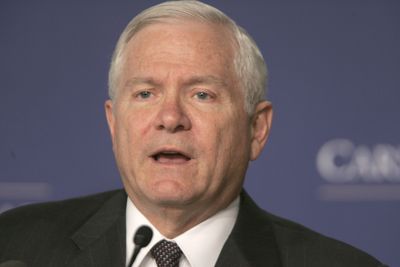Obama reportedly asks Gates to stay
National security announcements next

CHICAGO – Seeking experience in wartime, President-elect Barack Obama intends to re-enlist Defense Secretary Robert Gates as head of the Pentagon – if only temporarily – and has chosen a retired Marine general to be White House national security adviser, officials said Tuesday.
Gates and retired Gen. James Jones would bring decades of experience to the administration of a 47-year-old commander in chief who campaigned on a pledge to redeploy combat troops in Iraq within 16 months while simultaneously ramping up the U.S. military presence in Afghanistan.
While Gates has accepted Obama’s appointment, it was not clear that Jones had done the same.
Obama has also offered the post of secretary of state to Sen. Hillary Rodham Clinton of New York, his rival in the campaign for the White House. Officials have not yet disclosed whether she has decided to give up her seat in Congress to join the Cabinet.
Whatever Clinton’s decision, aides to the president-elect say he intends to announce members of his national security team next week, after disclosing his top economic advisers in recent days.
Gates, who has served as President George W. Bush’s defense secretary for two years, will remain in the Cabinet for some time, probably a year, according to an official familiar with discussions between him and the president-elect. His appointment would fulfill an Obama pledge to include a Republican in his Cabinet.
A Democratic official said Jones was Obama’s pick to head the National Security Council, the part of the White House structure that deals with foreign policy.
The officials spoke on condition of anonymity because Obama has not authorized anybody to discuss the developments.
Obama’s search for intelligence officials was less clear. John Brennan, who had been considered a top pick for CIA director, withdrew his name from consideration. He cited a groundswell of criticism about his association with the Bush administration’s sanctioning of harsh interrogations of terror suspects.
Former Adm. Dennis Blair has emerged as a likely candidate for director of national intelligence, which oversees CIA and other intelligence agencies.
Retaining Gates provides stability for a stretched military fighting two wars during the changeover in administrations. Gates once said it was inconceivable that he would stay on past the close of Bush’s term on Jan. 20.
But the 65-year-old former spymaster had recently turned mum in public on the circumstances under which he would stay, even briefly, in an Obama administration.
Keeping Gates might afford Obama a sort of extended transition, in which critical military issues are left in trusted hands while Obama focuses most intensely on the financial crisis.
Gates has run the department since December 2006, reluctantly giving up his post as president of Texas A&M University to replace Donald H. Rumsfeld when the Iraq war seemed to be failing.
He has gained a reputation as a steady pragmatist, but Gates’ resume as a government policymaker is not untarnished.
During his 1991 confirmation hearings to be CIA director, Gates was criticized for missing clues about the impending fall of the Soviet Union and for politicizing Cold War intelligence. Those two complaints – misreading intelligence and using it selectively – have also dogged the Bush administration in its Iraq policy.
But supporters see Gates as a seasoned policymaker who climbed the CIA bureaucracy from an entry-level position to become director under President George H.W. Bush. He also served on his National Security Council, as he had for Presidents Carter and Reagan.